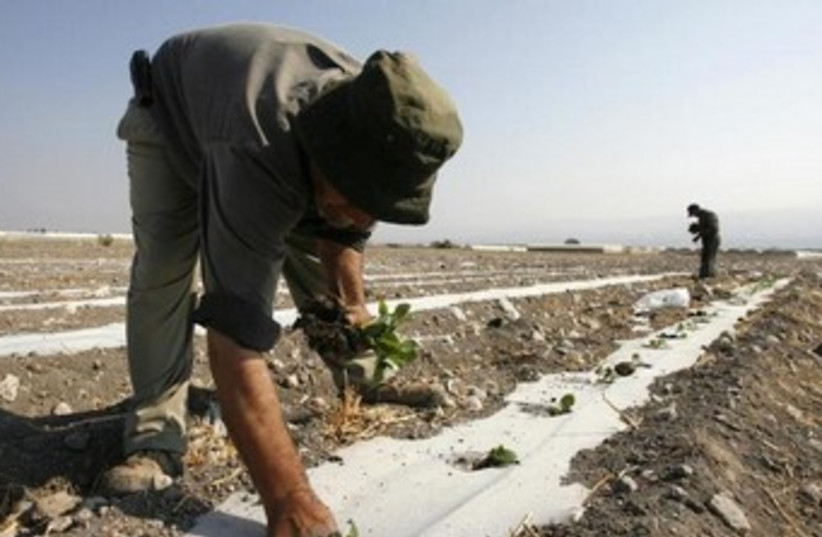The Middle East and North Africa region is one of the most water-stressed in the world. According to statements issued by local authorities at the MENA Desalination Projects Forum 2022, held last week in Abu Dhabi ahead of World Water Day on Tuesday, 14 of the 20 countries in the world with the highest amount of water scarcity, are located in the MENA region.
For more stories from The Media Line go to themedialine.org
Aiman Eid Al-Rawajfeh, a professor of Chemical Engineering and Desalination at Tafila Technical University in Jordan, and a Jordan Engineering Association-certified consultant on seawater desalination and environment, told The Media Line that the current demand of water in the region is greater than the drinkable water available.
“There is great shortage between supply and need in the MENA region, and Jordan is one of the poorest countries in water resources and supply,” he said.
Al-Rawajfeh explained that this is due to the lack of natural potable water sources and – mostly – due to the rapid population growth in the area, which includes, in Jordan’s case, many refugees migrating to the country, exponentially increasing the water demand.

For that reason, Al-Rawajfeh suggests that there should be a greater cooperation among the MENA countries to help one other to improve their desalinization plants, in order to make them more efficient and able to become a more significant solution.
Jordan, for instance, has only one desalinization plant, located in Aqaba, which Al- Rawajfeh describes as “very small.”
He says that almost none of the water used in Jordan comes from the desalinization plant. Most of the water comes from ground water pumped from the Disi aquifer, or from Jordan’s share of the water from the Yarmouk and Jordan rivers. In addition, some water is treated and used.
This has become an insufficient source for the country due to a population that continues to grow, according to Al-Rawajfeh. That is why he suggests that the Gulf countries, which have greater financial resources,
and experience in desalinization, should invest in such projects in other MENA countries including Jordan in a show of regional cooperation.
“Suitable funding should be supplied to the researchers, and innovations for more R&D and commercialization of some great ideas to solve the problem” he said. In addition to the high cost of desalinization of water, Al-Rawajfeh explained that, if the process is not done properly, it could also cause environmental damage.
“The residue left after the process, meaning the high concentration of brine, is an
issue,” he said. “But suitable treatment should be practiced to protect the environment,” he added.
Israel is one of the leading countries in the region in finding alternative solutions to similar water scarcity problems.
One of the most innovative solutions is provided by the Israeli company Watergen, a global leader in Atmospheric Water Generation (AWG) technology. Watergen's technology provides a completely new and seemingly unlimited water resource – the air.
Michael Rutman, Watergen co-CEO, and Jenny Goldman, marketing manager of Emerging Markets for Watergen, told The Media Line that the Watergen technology represents a significant effort to find a solution to what Goldman called “probably the most pressing crisis of the 21st century – the water crisis.”
“Watergen’s technology extracts water from the air by enabling the air to move fast into the patented Genius system in a significantly short time, ensuring greater efficiency and thus using less energy,” Goldman explained.
The machine includes an “energy-efficient heat exchange module, using condensation as a means of producing fresh water. One liter of water costs 7-15 cents, which depends on local electricity costs,” she said.
Watergen offers a variety of water supply solutions, with machines that can generate from 12 liters to 6,000 liters per day. “The technology can be implemented at home or office; in commercial and industrial scales; and can even be generated on-the-go, totally off-grid. Currently, Watergen provides an essential water supply to corporate offices,
restaurants, hotels, hospitals and distilleries,” she said.
Goldman explained that Watergen operates on five different continents, providing water to companies and governments in multiple countries around the globe. Watergen has five production lines worldwide, and is setting up more, to meet the demand.
The vision of Dr. Mikhael Mirilashvili, the president of Watergen, is to provide clean and safe drinking water to every corner of the globe, according to Goldman. With its pathbreaking technology, Goldman said, “Watergen is working with governments, NGOs, and multinational corporations around the world in order to
realize its mission: to solve the severe drinking water crisis that plagues almost every country.”
